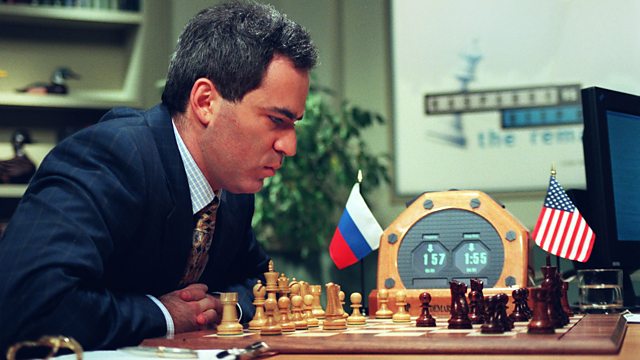Chess algorithms
In 1997, Garry Kasparov, widely regarded as the world's greatest chess player, was defeated by a computer. But how much did that reveal about the 'brainpower' of machines?
In 1997, Garry Kasparov, widely regarded as the world's greatest chess player, was defeated by Deep Blue, a computer. But how much did that reveal about the 'brainpower' of machines? Tim Harford explains by delving into the history of algorithms. They've been used by mathematicians and scientists for millennia, but have acquired a new level of power and importance in the digital age.
Last on
Image credit
Sources
Christopher Steiner Automate This New York: Portfolio Penguin 2012; Claude E. Shannon"A Symbolic Analysis of Relay and Switching Circuits". Trans. AIEE. 57 (12): 713–723. 1938
.laude E. Shannon “Programming a Computer for Playing Chess” Philosophical Magazine, Ser.7, Vol. 41, No. 314 - March 1950.
Douglas Hofstadter Gödel, Escher, Bach New York: Basic Books 1979
, New Yorker, from around 5 minutes in.
James Somers “” The Atlantic November 2013
Hannah Kuchler “” The Financial Times 1 January 2020
Daniel Susskind London: Allen Lane 2020; AI Index Report 2019
Garry Kasparov “Chess, a Drosophila of reasoning” Science 7 December 2018
Pedro Domingos The Master Algorithm London: Penguin 2017
Broadcasts
- Sat 22 Feb 2020 05:50GMT�������� World Service Australasia, Americas and the Caribbean, Europe and the Middle East & East Asia only
- Sat 22 Feb 2020 14:50GMT�������� World Service News Internet
- Sun 23 Feb 2020 14:50GMT�������� World Service East and Southern Africa & West and Central Africa only
- Sun 23 Feb 2020 15:50GMT�������� World Service Australasia, UK DAB/Freeview & Online only
- Sun 23 Feb 2020 22:50GMT�������� World Service
- Mon 24 Feb 2020 04:50GMT�������� World Service South Asia
Podcast
-
![]()
50 Things That Made the Modern Economy
The stories of inventions, ideas and innovations which helped create the economic world


